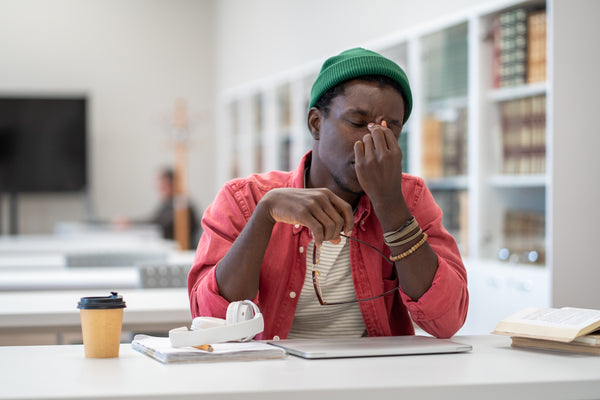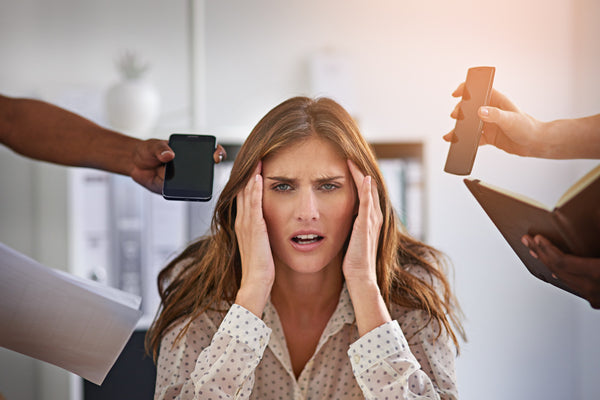Your cart is empty

9 Possible Reasons You're Low on Energy
🎧 On the go? Listen to The GOOD IDEA Audio Blog, available on Spotify or Apple Podcasts.
In the relentless rhythm of modern life, low energy has become an all too common complaint. From the moment our alarms scream in our ears to the last email we send before bed, we often find ourselves pleading guilty to fatigue.
But why is it that so many of us feel drained, when we're doing our best to juggle healthy habits with professional and personal demands?
Uncovering the culprits behind our energy droughts is the first step to reclaiming vitality. In this deep-dive guide, we’ll explore the 9 most likely suspects causing your energy levels to plummet, along with actionable strategies to recharge. Whether you're a wellness devotee, a busy professional, or someone who simply wants to feel more at ease in their energy, this post is for you.
What Is Fatigue?
Before we dive into the possible reasons for low energy, let's first define what fatigue actually is. Fatigue is a state of extreme tiredness or exhaustion that can affect both our physical and mental well-being. It may be accompanied by feelings of weakness, lack of motivation, and difficulty concentrating.
There are two main types of fatigue: acute and chronic. Acute fatigue is short-term and can be remedied by getting a good night's sleep or taking a break to rest. Chronic fatigue syndrome, on the other hand, lasts for an extended period (usually at least six months) and can have a significant impact on daily life.
Fatigue Symptoms
Fatigue can manifest in various ways, and the symptoms may vary from person to person.
Some common signs of fatigue include:
- Constant tiredness or lack of energy throughout the day
- Difficulty concentrating or making decisions
- Feeling physically weak or drained
- Irritability or mood swings
- Headaches or body aches
- Loss of appetite or increased cravings for unhealthy foods
- Trouble falling or staying asleep at night
Now that we have a better understanding of what fatigue is, let's explore some possible causes of fatigue . . .

1. Inadequate Sleep
The Slumber Deficit
There's no substitute for a good night's sleep, yet it’s one of the first things compromised in our quest to get more done. Long-term sleep deprivation not only affects our mood and cognitive function but is a major contributor to chronic fatigue.
Actionable Zzzs
- Prioritize sleep hygiene, setting a consistent bedtime and wake-up time.
- Wind down with a calming routine before bed, such as reading or meditating to help yourself fall asleep quicker.
- Optimize your sleep environment – a dark, quiet, and cool bedroom can work wonders!
2. Poor Diet
What You Eat Is How You Feel
The food we eat directly correlates with our energy levels. Diets high in sugar and processed foods can cause sudden spikes and crashes in blood sugar, causing us to feel tired.
Superchargers for Energy
- Focus on whole, nutrient-dense foods like healthy fats, vegetables, and lean proteins.
- Stay hydrated with water-rich foods and drink plenty of water throughout the day.
- Incorporate complex carbohydrates for sustained energy levels – think legumes and whole grains.
- Include the nutrients and vitamins your body needs to maintain homeostasis. One of the biggest imbalances that can zap energy are blood sugar imbalances. GOOD IDEA works to mitigate large blood sugar spikes by fueling the body with the right amino acids and nutrients!
Psst … taking care of your diet doesn’t have to be hard. Don’t believe us? Check out an article on Low-Carb Fast Food Options: Chick-fil-A Edition and Starbucks Edition.
3. Lack of Physical Activity
Motion Is Lotion for the Mind and Body
Sedentary lifestyles contribute to a feeling of severe fatigue and lethargy. Exercise boosts our cardiovascular health, improves circulation, and enhances the delivery of oxygen and nutrients to our cells.
Moving More, Feeling More
- Set reminders to stand up and move every hour, even if it’s just a quick walk around your space.
- Incorporate short bursts of high-intensity exercise into your day – try a 15-minute HIIT session.
- Engage in activities you enjoy, as enjoyment can be a powerful motivator for consistent exercise.

4. Stress
The Silent Saboteur of Energy
Chronic stress keeps your body in a state of high alert, sapping your energy over time. In today’s world, burnout fatigue is a common and very real consequence of prolonged stress.
Stress-Busting Habits
- Practice relaxation techniques like deep breathing, yoga, or tai-chi.
- Set realistic expectations for what you can accomplish in a day.
- Prioritize self-care activities that bring you joy and peace.
5. Dehydration
The Elixir of Life and Energy
Even mild dehydration can lead to a dip in energy. Water is essential for the proper function of every cell in your body, including those that govern your energy levels.
Quench Your Thirst for Energy
- Carry a reusable water bottle with you as a visual reminder to drink throughout the day.
- Consume hydrating foods like cucumbers and watermelon.
- Monitor your urine color – a clear color indicates you're well-hydrated.
- Consider health-focused drinks including GOOD IDEA, which are both hydrating and help lower blood sugar spikes at the same time (another sneaky culprit to low energy).
6. Underlying Health Conditions
When Low Energy Is a Red Flag
Sometimes fatigue is a symptom of an underlying health problem or a medical condition such as anemia, diabetes, or thyroid issues. It’s important to listen to your body's signals and seek medical advice if fatigue is a persistent problem.
Know Your Baseline
- Pay attention to the quality of your sleep and any changes in your energy levels.
- Don’t ignore other symptoms that may accompany fatigue, such as unexplained weight changes or mood disturbances.
- Visit your healthcare provider for regular check-ups to monitor and manage your health.

7. Lifestyle Factors
Habits That Steal Your Mojo
Certain lifestyle choices can significantly impact your energy levels. Smoking, excessive caffeine, and alcohol can interfere with your body's natural energy systems, leaving you drained.
A Healthier Balance
- Limit caffeine to moderate amounts and avoid consumption in the late afternoon and evening.
- If you smoke, seek support to quit – the benefits for your energy (and overall health) are immense.
- Consume alcohol in moderation or consider periods of abstinence to gauge its effects on your energy.
8. Lack of Sunlight Exposure
The Power of Vitamin D
Sunlight exposure helps our bodies produce vitamin D, a crucial nutrient for energy production. With many people spending most of their days indoors, we may not be getting enough sunlight to support optimal energy levels.
Soak Up the Sun
- Try to spend at least 15 minutes outside in the sun each day.
- Consider taking a vitamin D supplement, especially if you live in an area with limited sunlight.
- If possible, incorporate natural light into your workspace or home to increase your exposure throughout the day.
9. Mental Exhaustion
The Weight of Overthinking
Constantly running through mental to-do lists and worrying about future tasks can drain our mental energy. Though it may seem like we're being productive, this type of mental exhaustion can hinder our ability to focus and be efficient.
Mental Recharge
- Practice mindfulness techniques to help quiet the mind and reduce overthinking.
- Take breaks throughout the day to step away from work and give your brain a rest.
- Incorporate activities that bring you joy and help you recharge mentally, such as creative hobbies or spending time in nature.
FAQs
Q: Can low energy be a sign of a serious health condition?
A: Yes, chronic fatigue can be a common symptom that sometimes indicates an underlying medical condition. It’s essential to listen to your body and seek medical advice if you experience persistent fatigue.
Q: Is it possible to have too much sleep?
A: Yes, oversleeping can also lead to feelings of lethargy and extreme fatigue. It’s important to aim for a consistent and adequate amount of sleep each night.

Q: Can exercise actually boost my energy levels?
A: Yes, regular physical activity can increase your overall energy levels by improving circulation.
Q: Is it common to experience an energy crash in the afternoon?
A: Yes, many people may experience a dip in energy levels in the late afternoon due to natural fluctuations in our circadian rhythm. Blood sugar also tends to drop after a lunch high in simple carbohydrates, which can also contribute to a crash.
Looking for a solution to that post-lunch dip? Try GOOD IDEA, which contains five essential amino acids and a small amount of the essential mineral chromium, in the form of chromium picolinate, which work together to reduce blood sugar spikes.
Q: Are there any supplements that can help improve energy levels?
A: Supplements like vitamin B12 and iron can be beneficial for those with deficiencies or underlying health conditions causing fatigue. However, it’s generally recommended to consult with a healthcare provider before taking any supplements.
Q: Can improving my diet really make a difference in my energy levels?
A: Yes, eating a diet higher in lean protein, healthy fats, and fiber and low in simple sugars can provide sustained energy throughout the day and help prevent blood sugar crashes.
Q: Can stress affect my energy levels even if I am getting enough sleep?
A: Yes, chronic stress can impair the quality of your sleep and lead to feelings of fatigue. It’s important to find healthy ways to manage stress to improve overall energy levels.
Q: Is it normal for energy levels to fluctuate throughout the day?
A: Yes, it’s quite normal for energy levels to naturally fluctuate throughout the day due to circadian rhythms and daily activities. However, consistently feeling exhausted or experiencing extreme dips in energy may be a sign of an underlying issue.
Q: Can social connections impact my energy levels?
A: Yes, having positive relationships and strong social connections can improve overall mental health and well-being and contribute to higher energy levels.
Conclusion
The world is not set up to nurture our energy. We must intentionally craft our lives to support it. By understanding the potential causes of low energy and adopting strategies to address them, you can gradually build a reservoir of vitality that sustains you through even the most demanding days.
Remember, small lifestyle changes can yield significant results. Start with the culprit that resonates most with you, and commit to addressing it. Your energy is one of your most precious resources – guard it carefully, nurture it lovingly, and watch as your life transforms in response.
Feeling energized is about more than just crossing items off our to-do lists; it's about living fully and passionately. It's a continual process of tuning into our bodies and responding with care. Take the first step today with GOOD IDEA, and feel the difference that a reinvigorated approach to your well-being can make.
Want to learn more about energy management? Check out our other articles on diet, exercise, stress management, and more!
- Choosing a selection results in a full page refresh.


